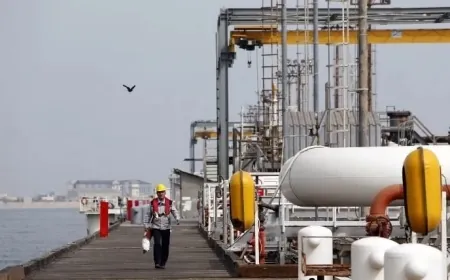Oil Markets Anticipate Steepest Weekly Slide Since February Amid Geopolitical Calm
Middle East Tensions Ease and Fuel Demand Softens, Prompting Oil Price Decline

Oil markets are bracing for the most significant weekly downturn since February, driven by diminishing geopolitical tensions in the Middle East and a softening demand across fuel sectors.
Brent crude, currently lingering below the $84 mark per barrel, is facing a weekly loss exceeding 6%, while West Texas Intermediate remains close to $79. In a noteworthy development, Hamas is reportedly mulling over a temporary cease-fire proposal with Israel and is preparing to send a delegation to Egypt for further negotiations. Simultaneously, recent data from the United States underscores a decline in implied gasoline demand just ahead of the crucial summer driving season.
The descent in oil prices, marking a drop of around 10% from its mid-April peak, follows the relatively contained aftermath of Iran's unprecedented attack on Israel and Washington's active efforts towards conflict resolution in Gaza. Wednesday's unexpected surge in US crude inventories triggered a futures slump, exacerbating concerns over demand from China, the world's leading importer, as well as weaknesses in diesel and gasoline markets.
Robert Rennie, head of commodity and carbon strategy at Westpac Banking Corp, remarked, “The geopolitical premium is swiftly dissipating as Israel displays greater openness to a hostage deal. A significant breakthrough above the $90-$95 range for Brent seems improbable, and breaching the $85 mark suggests a notable peak has been reached.”
The ongoing decline in prices has sparked speculation that OPEC+ will extend output cuts. Nearly 90% of traders and analysts surveyed by Bloomberg anticipate the group will prolong restrictions when it convenes on June 1. However, there is potential for disagreement at the meeting, following announcements by the United Arab Emirates's primary oil company of increased production capacity, bolstering the member's argument for elevated oil production.
Sinead Gorman, Chief Financial Officer of Shell Plc, emphasized the pivotal role of OPEC in maintaining supply-demand equilibrium, stating during an earnings call on Thursday, “OPEC will be instrumental in shaping the supply-demand balance.” Her remarks echo warnings issued by the International Energy Agency last month, cautioning that global oil markets could revert to surplus if the group and its allies relax supply restrictions amid slowing demand.
Also Read: US Initiates Diplomatic Efforts to Ease Gaza Conflict, Oil Prices Dip































































